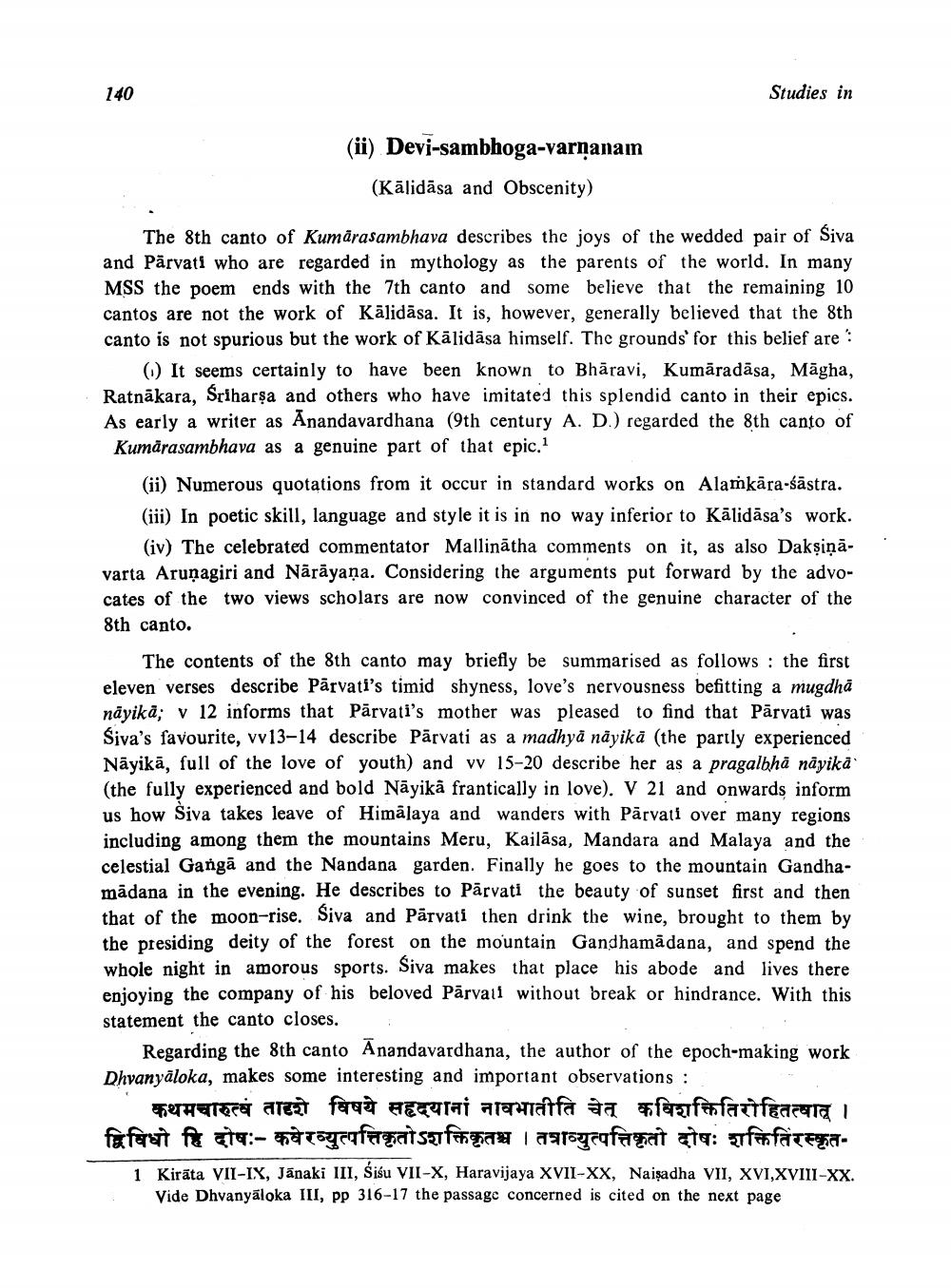________________
140
Studies in
(ii) Devi-sambhoga-varnanam
(Kālidāsa and Obscenity)
The 8th canto of Kumarasambhava describes the joys of the wedded pair of Siva and Parvati who are regarded in mythology as the parents of the world. In many MSS the poem ends with the 7th canto and some believe that the remaining 10 cantos are not the work of Kālidāsa. It is, however, generally believed that the 8th canto is not spurious but the work of Kālidāsa himself. The grounds' for this belief are :
It seems certainly to have been known to Bhāravi, Kumāradāsa, Māgha, Ratnākara, Sriharsa and others who have imitated this splendid canto in their epics. As early a writer as Anandavardhana (9th century A. D.) regarded the 8th canto of Kumārasambhava as a genuine part of that epic.
(ii) Numerous quotations from it occur in standard works on Alamkāra-śāstra. (iii) In poetic skill, language and style it is in no way inferior to Kālidāsa's work.
(iv) The celebrated commentator Mallinātha comments on it, as also Dakşiņāvarta Arunagiri and Nārāyaṇa. Considering the arguments put forward by the advocates of the two views scholars are now convinced of the genuine character of the 8th canto.
The contents of the 8th canto may briefly be summarised as follows: the first eleven verses describe Pārvati's timid shyness, love's nervousness befitting a mugdha nāyikā; v 12 informs that Pārvati's mother was pleased to find that Pārvati was Siva's favourite, vv13–14 describe Pārvati as a madhyā nāyikā (the partly experienced Nāyikā, full of the love of youth) and vv 15-20 describe her as a pragalbhā nāyikā (the fully experienced and bold Nāyikā frantically in love). V 21 and onwards inform us how Siva takes leave of Himālaya and wanders with Pārvati over many regions including among them the mountains Meru, Kailasa, Mandara and Malaya and the celestial Gangā and the Nandana garden. Finally he goes to the mountain Gandhamādana in the evening. He describes to Pārvati the beauty of sunset first and then that of the moon-rise. Siva and Pārvati then drink the wine, brought to them by the presiding deity of the forest on the mountain Gandhamädana, and spend the whole night in amorous sports. Siva makes that place his abode and lives there enjoying the company of his beloved Pārvali without break or hindrance. With this statement the canto closes.
Regarding the 8th canto Anandavardhana, the author of the epoch-making work Dhvanyaloka, makes some interesting and important observations :
कथमचारुत्वं तारशे विषये सहृदयानां नावभातीति चेत् कविशक्तितिरोहितत्वातू । द्विविधो हि दोषः- कवेरव्युत्पत्तिकृतोऽशक्तिकृतश्च । तत्राव्युत्पत्तिकृतो दोषः शक्तितिरस्कृत1 Kirāta VII-IX, Jānaki III, Sisu VII-X, Haravijaya XVII-XX, Naişadha VII, XVI,XVIII-XX.
Vide Dhvanyāloka III, pp 316-17 the passage concerned is cited on the next page




